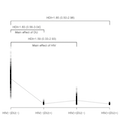Abstract
Objective: Drug users and HIV-seropositive individuals often show deficits in decision-making; however the nature of these
deficits is not well understood. Recent studies have employed computational modeling approaches to disentangle the
psychological processes involved in decision-making. Although such approaches have been used successfully with a
number of clinical groups including drug users, no study to date has used computational modeling to examine the effects
of HIV on decision-making. In this study, we use this approach to investigate the effects of HIV and drug use on decisionmaking
processes in women, who remain a relatively understudied population.
Method: Fifty-seven women enrolled in the Women’s Interagency HIV Study (WIHS) were classified into one of four groups
based on their HIV status and history of crack cocaine and/or heroin drug use (DU): HIV+/DU+ (n = 14); HIV+/DU2 (n = 17);
HIV2/DU+ (n = 14); and HIV2/DU2 (n = 12). We measured decision-making with the Iowa Gambling Task (IGT) and
examined behavioral performance and model parameters derived from the best-fitting computational model of the IGT.
Results: Although groups showed similar behavioral performance, HIV and DU exhibited differential relationship to model
parameters. Specifically, DU was associated with compromised learning/memory and reduced loss aversion, whereas HIV
was associated with reduced loss aversion, but was not related to other model parameters.
Conclusions: Results reveal that HIV and DU have differential associations with distinct decision-making processes in women. This study contributes to a growing line of literature which shows that different psychological processes may underlie similar behavioral performance in various clinical groups and may be associated with distinct functional outcomes.
